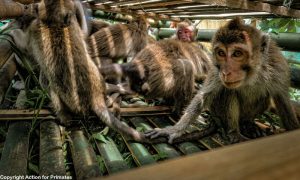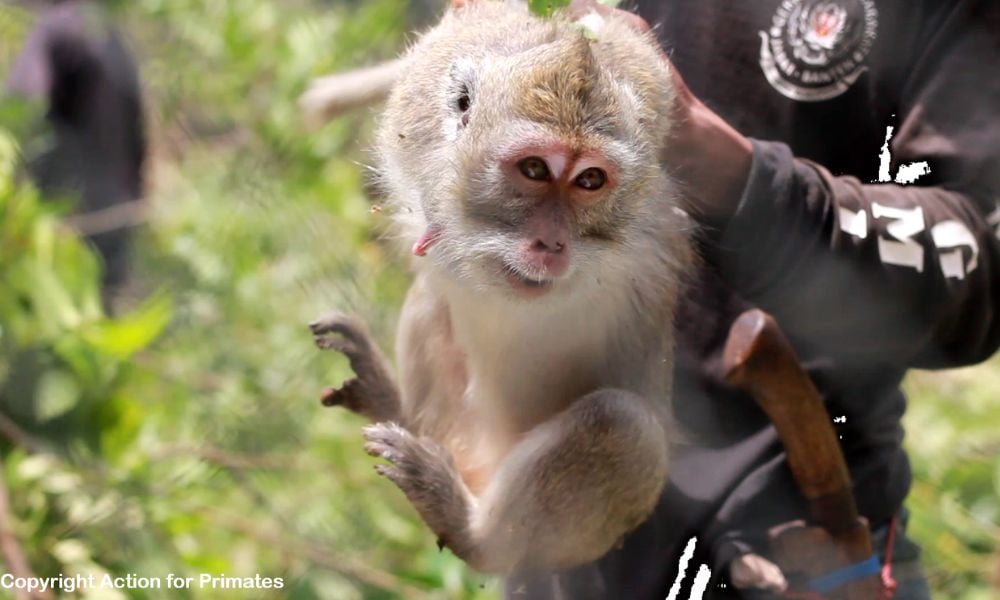UK-based nonprofit Action for Primates (AfP) is calling on all animal advocates to speak up for long-tailed macaques in Indonesia after obtaining new information that more than 800 wild macaques were captured from their forest homes and exported to US laboratories in 2022.
AfP, via a Freedom of Information request, learned that the US imported 990 long-tailed macaques (Macaca Fascicularis) — including 870 who were wild-caught — from Indonesia to be used in research and testing during 2022.
Long-tailed macaques are the primary nonhuman primate species used in regulatory toxicity tests, in which animals are intentionally poisoned to assess adverse reactions to drugs or chemicals. The brutal testing often involves substantial suffering and even death for the macaques.
But the gruesome nature of the testing isn’t the only suffering the intelligent, sentient primates are enduring.

(Courtesy of Action for Primates)
In 2021, the Indonesian government reauthorized the capture and export of wild long-tailed macaques, despite widespread global concerns about the inherent inhumanity of trapping wild monkeys. In 2022, AfP released harrowing video footage of the cruel wild captures, which included the forced separation of nursing infants from their mothers and the beating and killing of unwanted individuals.
“Action for Primates is calling on the US government to dissociate itself from this extreme cruelty by banning all imports of monkeys from Indonesia,” said Sarah Kite, co-founder, Action for Primates. “We are also urging the Indonesian government to stop the capture and export of wild monkeys for use in laboratories and to enact legislation that offers protection to the indigenous long-tailed macaque population.”
Nedim C. Buyukmihci, a doctor of veterinary medicine and a professor emeritus at the University of California, said that capturing non-human primates from the wild “is unquestionably associated with substantial suffering.”
“There is no such thing as ‘humane trapping,’” he said. ”The handling and treatment of the monkeys is brutal and inherently and inexorably inhumane, and a clear breach of international animal welfare guidelines.”

(Courtesy of Action for Primates)
Long-tailed macaques are indigenous to Indonesia and an important part of the country’s rich and unique biodiversity. The species, however, is not protected under Indonesian law. In addition to the capture and export for the global research and toxicity testing industry, wild populations face many other threats, including hunting for human consumption, death following negative interactions with people, and capture for the “pet” trade or for use in tourism and “entertainment” activities — including the disturbing rise in baby macaque abuse videos filmed for broadcast on social media.
Since the Indonesian government allowed wild captures to resume, the long-tailed macaque’s conservation status has been uplisted to “Endangered,” with a decreasing population trend, by the International Union for the Conservation of Nature (IUCN) Red List of Threatened Species.
Please use your voice today to help long-tailed macaques by participating in AfP’s newest action alert, calling on the US government to stop cruel imports and for the Indonesian government to once again prohibit wild captures!
What you can do to help:
- Click here – [email protected] – to create a sample message you can edit and send to Dr. Ir. Siti Nurbaya Bakar, Indonesia Minister of Environment and Forestry, with Cc to an alternate E-mail address.
- If you have a problem with the above link, you can click here to access the relevant information to create a message manually.
- Click here – [email protected] – to create a sample message you can edit and send to Martha Williams, Director of USFWS.
- If you have a problem with the above link, you can click here to access the relevant information to create a message manually.
- Send an E-mail to the Indonesian Embassy in your country: https://www.embassy-worldwide.com/country/indonesia/.
- Sign and share this petition (Action for Primates thanks everyone who has already done so): Siti Nurbaya Bakar, give Indonesia’s monkeys legal protection now.
Then, if you haven’t already, please also sign and share Lady Freethinker’s petition urging US authorities to stop importing wild-caught macaques from Indonesia!
SIGN: Justice for Indonesian Monkeys Trapped and Brutalized for Research Labs








